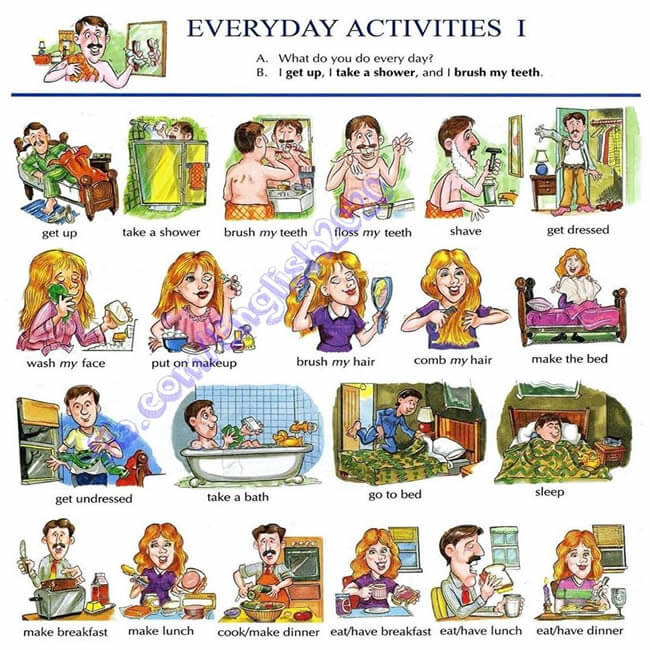Phrasal Verbs, Meanings and Example Sentences – A & B
Phrasal Verbs: A
act up (no object): misbehave (for people); not work properly (for machines).
“The babysitter had a difficult time. The children acted up all evening.”
“I guess I’d better take my car to the garage. It’s been acting up lately.”
act like (inseparable): behave in a way that’s like _____ .
“What’s wrong with Bob? He’s acting like an idiot.”
Note: This phrasal verb is very informal.
add up (1. no object): logically fit together.
“His theory is hard to believe, but his research adds up.”
Note: This phrasal verb is often negative.
“His theory seems, at first, to be plausible, but the facts in his research don’t add up.”
add up (2. separable): find the total.
“What’s the total of those bills? Could you add them up and see?”
add up to (inseparable): to total.
“The bills add up to $734.96. That’s more than I expected!”
ask out (separable): ask for a date.
“Nancy has a new boy friend. Joe asked her out last night.”
Phrasal Verbs: B
back down (no object): not follow a threat.
“Tom was going to call the police when I told him I’d wrecked his car, but he backed down when I said I’d pay for the damages.”
back off (no object): not follow a threat.
“Tom was ready to call the police when I told him I’d wrecked his car, but he backed off when I said I’d pay for the damages.”
back up (1. no object): move backward; move in reverse.
“You missed the lines in the parking space. You’ll have to back up and try again.”
“The people waiting in line are too close to the door. We won’t be able to open it unless they back up.”
back up (2. separable): drive a vehicle backwards (in reverse).
“You’re too close! Back your car up so I can open the garage door.”
back up (3. separable): confirm a story, facts, or information.
“If you don’t believe me, talk to Dave. He’ll back me up.”
back up (4. separable): make a “protection” copy to use if there are problems with the original.
“When my computer crashed, I lost many of my files. It’s a good thing I backed them up.”
beg off (no object): decline an invitation; ask to be excused from doing something.
“At first Lily said she would be at the party. Later she begged off.”
blow up (1. separable): inflate.
“We needs lots of balloons for the party. Will you blow them up?”
blow up (2. separable): explode; destroy by exploding.
A: “That old building really came down quickly!”
B: “That’s because the construction company used dynamite to blow it up.”
blow up (3. no object): suddenly become very angry.
“When I told Jerry that I’d had an accident with his car, he blew up.”
bone up on (inseparable): review / study thoroughly for a short time.
“If you’re going to travel to Peru, you’d better bone up on your Spanish.”
break down (1. separable): separate something into component parts.
“We spent a lot of money at the supermarket. When we broke the total cost down, we spent more on cleaning supplies than food.”
break down (2. no object): stop working / functioning.
“Sharon will be late for work today. Her car broke down on the freeway.”
break in (1. often no object; with an object, break into–inseparable): enter by using force (and breaking a lock, window, etc.)
“Jane’s apartment was burglarized last night. Someone broke in while Jane was at the movies.” / “Somebody broke into Jane’s apartment while she was at the movies.
break in (2. separable): wear something new until it’s / they’re comfortable.
“These are nice shoes, but they’re too stiff. I hope it doesn’t take too long to break them in.”
break in (3. separable): train; get someone / something accustomed to a new routine.
“I hope I can learn my new job quickly. The manager hasn’t scheduled much time for breaking me in.”
break up (1. no object): disperse; scatter.
“What time did the party break up last night?”
break up (2. usually no object; with an object, break up with [inseparable)]): end a personal relationship.
“Tim and Julie aren’t going steady any more. They got really angry with each other and broke up.”
“Have you heard the news? Julie broke up with Tim!”
“I’m sorry to hear that their marriage broke up. I’m sure the divorce will be difficult for the children.”
bring / take back (separable): return something.
“Yes, you can borrow my pen, don’t forget to bring it back to me when you’re finished.”
“This book is due tomorrow. I guess I should take it back to the library.”
bring off (separable): accomplish something difficult; accomplish something people had considered impossible or unlikely.
“No one thought Chuck could get an A in that course, but he brought it off. ”
bring up (1. separable): mention (as a topic of discussion).
“We planned to discuss overtime pay in the meeting. Why didn’t someone bring that topic up?”
bring up (2. separable): raise; rear.
“Lucy’s parents died when she was a baby. Her grandparents brought her up.”
brush up on (inseparable): review / study thoroughly for a short time.
“If you’re going to travel to Peru, you’d better brush up on your Spanish.”
burn down (no object): become destroyed / consumed by fire.
Note: For upright things–trees, buildings, etc.–only.
“Lightning struck Mr. Kennedy’s barn last night. It burned down before the fire fighters arrived.”
burn up (1. no object): become destroyed / consumed by fire.
Note: For people and non-upright things only.
“All of Mr. Kennedy’s hay burned up when his barn burned down.”
burn up (2. separable): cause someone to become very angry.
“Did you hear how rudely Fred talked to me? That really burned me up!”
butt in (no object): impolitely interrupt (a conversation, an action).
“Hey, you! Don’t butt in! Wait for your turn!”
butter up (separable): praise someone excessively with the hope of getting some benefit.
“I guess Marty really wants to be promoted. He’s been buttering his boss up all week.”
Source: www.nabilinda.com



